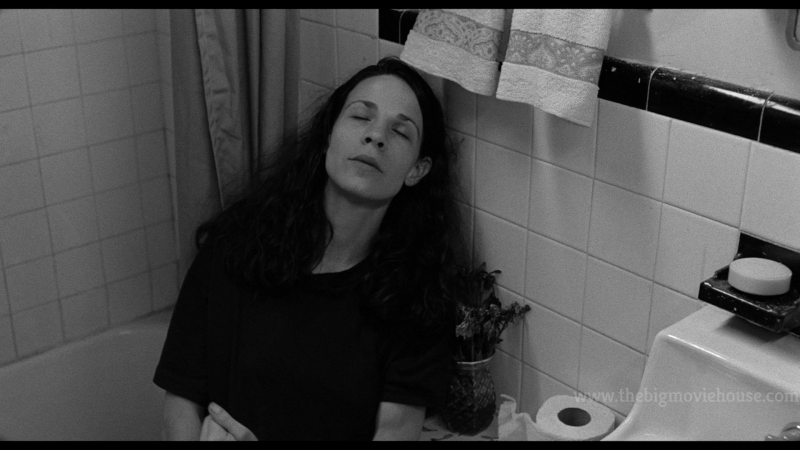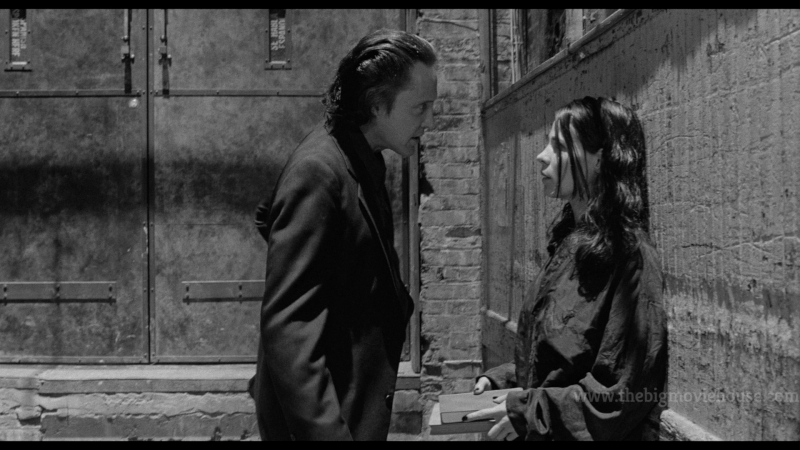Movie Review: The Addiction (1995)
[The movie stills in this post are from thebigmoviehouse.com, used here on Fair Use basis.]
The 1995 black-and-white film by Abel Ferrara, a filmmaker notorious for his devotion to provocative and controversial themes (Pasolini, The Driller Killer) and gritty urban settings (Bad Lieutenant), could have easily been a Taxi Driver spin-off. Instead of a Vietnam War vet we would however get as a lead character a philosophy graduate student named Kathleen Conklin, played by Lili Taylor, who’s nowadays perhaps most recognizable for her lead role in the original The Conjuring film as Carolyn Perron.
The Addiction is strikingly different from everything its director was most known for at the time. Even though the vampirism element, which basically shapes the whole character driven plot here, acts much like the reason for people getting harmed in their apartments and on streets, being essentially no less violent than violence in other films by Ferrara; this is still more a metaphor than means of delivering that violence. While the film’s title spells it out quite clearly what the aforementioned metaphor is all about, the reason why The Addiction suddenly triggered a mostly latent review writer in me was, first and foremost, the viewpoint offered in this movie, which, I thought, transcended the topic of drug abuse. This, in my view, had been achieved by the writer Nicholas St. John putting the lead heroine, a philosopher into something hitherto unknown, which introduces her to aspects of life she hadn’t been aware of. Philosophy, being the love of wisdom, deals with meaning of life and also the meaning in life to a great extent. But how can one be a philosopher with just an academic knowledge about life? (There are references in this film to existentialists, Protagoras and even William S. Burroughs, who’s novel Naked Lunch is being mentioned by Christopher Walken’s Peina.) Kathleen’s knowledge is put to the test when she has to go through cravings, using other people to deal with those, and the realization she is rotting inside. What can be a greater predicament for appreciating all that life has to offer than having this condition, which prevents one from enjoying that life?

The Addiction movie still with Lili Taylor.
Along with addiction comes a reoccurring instance of addicted people telling other people to tell the former to go away. In a way The Addiction is a study of why people wouldn’t tell the addicts to go away. One cannot not notice how the film does this with a perfect rhythm. There is no urgency in those scenes and every character’s moments of transmutation are given enough time to reveal the philosophy behind their actions, or sometimes inaction. Besides, the framing in The Addiction is indeed exceptional – the scene, where Kathleen has a conversation with anthropology student (played by Kathryn Erbe) in a bathroom is shot with the latter being seen in a mirror using an over the shoulder shot; a choice that lets the camera to capture wholly and in an aesthetically interesting way the point, where Kathleen is at that moment psychologically and philosophically speaking. The same goal is being achieved in a two shot scene with Kathleen’s fellow student Jean (Edie Falco) at what seems to be a cafe, only this time Lili Taylor’s acting skills get the whole attention since Jean acts only as a listener with occasional questions as opposed to a character who’s just gone through a life transforming experience. In my view, these two aforementioned scenes basically embody that what The Addiction as a whole manages to impress the viewer with. Firstly, it’s the in-depth and successful exploration of the means of expression black-and-white cinema provides a filmmaker with. The lights and contrast in those settings is everything. In The Addiction the effect of those is mostly used to depict someone who is becoming more and more “a child of the night”; predatory, nocturnal, unable to bear the sunlight. What augments the effect of all that is the unmarred sense of aesthetics, which so many scenes in this film are enriched with; that applies to practically every detail: the rhythm, framing, camera angles, backdrops and props. Secondly, the spirit of explorer, eternally craving for more, which is not only expressed by the look of Lili Taylor, but constitutes a part of her overall temperament. There is really no competition to these aspects, characteristic to the actress; which obviously fits the journey of a philosopher in this film perfectly. In this sense the highlight perhaps is the scene with Peina in the elevator, where Kathleen for the first time has met someone who claims to not only be familiar with what the heroine is going through, but also with the state of things and mind beyond the condition, which up to that point had seemed like the end of the line: fixed, inevitable, eternal. The expression and looks Kathleen is giving Peina, who thus at that moment is being elevated to the place of avatar of miraculous light of revelation, is something that, in my opinion, just can’t be made up. What makes Lili Taylor’s role in this film even more remarkable is the fact that the aforementioned looks aren’t lost on the course of suffering throughout the film; the torture is the price Kathleen accepts as one that gains her the philosopher’s wisdom in practice.

The Addiction movie still with Christopher Walken and Lili Taylor.
Lastly, I would like to mention some films, which The Addiction at certain points reminded me of. Being the film, where an individual is mostly different from a part of society he/she had formerly been part of, and an analysis of that difference is taking place, it reminded me of Brian Yuzna’s Society – especially the orgy scenes with vampirism. As a film dealing with epidemic, where people revert to earlier evolutionary stages and cannibalistic tendencies, it reminded me of both, the original black-and-white zombie classic The Night of the Living Dead and David Cronenberg’s Rabid. While The Addiction may feel different from any of the aforementioned, the intellectual and philosophical value in it does give the feeling as if it’s been cut from the cloth from the same charity shop.
https://twitter.com/229042655/status/1597982873814196226
The rewards earned on this comment will go directly to the people sharing the post on Twitter as long as they are registered with @poshtoken. Sign up at https://hiveposh.com.
Interesting concepts brought in the movie

Nice review
!1UP
You have received a 1UP from @gwajnberg!
@cine-curator, @vyb-curator, @pob-curator, @neoxag-curator, @pal-curator
And they will bring !PIZZA 🍕.
Learn more about our delegation service to earn daily rewards. Join the Cartel on Discord.
I gifted $PIZZA slices here:
@curation-cartel(20/20) tipped @peerynt (x1)
Learn more at https://hive.pizza!